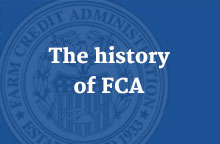
Benefits
Although part of the federal government, FCA has a more flexible salary and benefits program than most other government offices. Many benefits are paid for by the agency, at no cost to employees, while others are generously subsidized. The following provides highlights of FCA’s benefit programs.
Note: This is only a summary, and all benefits are subject to amendments. If a conflict exists between this summary and the full program or plan provisions, the provisions will prevail.
-
Federal employees can choose from a wide selection of health insurance plans for themselves and their families. Currently, the federal government pays on average 72% of the cost of coverage. Unlike a growing number of private-sector workers, federal employees, under certain conditions, can continue their health insurance into retirement with the same government subsidy. As a benefit for its active (that is, unretired) employees, FCA covers on average 90% (an additional 18%) of their cost of coverage. FCA employees and their families may choose from the following types of plans:
- Fee-for-service
- Health maintenance organization (HMO)
- HMO point-of-service
- Consumer-driven
- High-deductible
- Preferred provider
Employees and eligibile family members also have access to the comprehensive dental and vision insurance under the Federal Employees Dental and Vision Insurance Program (FEDVIP).
-
Congress created the Federal Employees Retirement System (FERS) in 1986, and it became effective on January 1, 1987. Since that time, new federal civilian employees who have retirement coverage are automatically covered by FERS. The plan consists of three tiers:
- The basic benefit plan establishes an annuity based on an employee’s age, years of federal service at retirement, and average highest salary over a consecutive three-year period. Disability and survivor benefits are also provided.
- Social Security pays benefits at retirement based on an employee’s age and earnings from Social Security-covered wages. Disability and survivor benefits are also provided.
- The thrift savings plan (TSP) allows employees to save and invest part of their income for retirement, receive matching agency contributions, and reduce their current taxes. The plan is similar to 401(k) plans offered by private employers. Employees participating in the TSP can choose among several investment plans and funds.
In 2015, FCA introduced the FCA 401(k) plan to provide its employees with a retirement savings and investment plan in addition to the TSP. Through this plan, eligible employees may make tax-deferred contributions. Whether or not the employee contributes, FCA automatically contributes 1% of the employee's salary to the agency's 401(k) savings plan. Employees who contribute can receive up to an additional 2% in agency-matching contributions for a total of 3% from FCA each year.
- The basic benefit plan establishes an annuity based on an employee’s age, years of federal service at retirement, and average highest salary over a consecutive three-year period. Disability and survivor benefits are also provided.
-
All employees are automatically enrolled in federal group life insurance unless they opt out of the coverage. The basic coverage equals annual pay (rounded to the next $1,000) plus $2,000. Employees pay two-thirds of the cost of basic life coverage and the government pays one-third. Additional life insurance coverage for employees and their families may be purchased.
-
Flexible spending accounts allow employees to pay out-of-pocket health and dependent care expenses with pre-tax dollars. FCA contributes $500 to the account of each employee.
-
A life cycle spending account helps employees save money for adoption, child care, elder care, fitness/recreation, or insurance premiums not reimbursed under another program or insurance policy. FCA contributes $800 to each employee’s account.
-
- Long-term disability: Employees who work at least 30 hours per week are automatically enrolled in FCA’s long-term disability insurance, at no cost to them, on the first day of active employment.
- Long-term care: Federal employees and retirees may purchase federal long-term care insurance for themselves and qualified family members. They can apply for long-term care insurance even if they do not enroll in the FEHB program.
- Short-term disability: The Federal Employees’ Compensation Act provides compensation benefits to civilian employees of the United States for disability due to personal injury sustained while in the performance of duty. The act also provides for compensation for employment-related disease.
-
- Eleven paid federal holidays per year.
- Annual leave: Employees accrue 13 days of paid annual (vacation) leave in the first year of employment. They earn additional annual leave as their tenure increases, up to a maximum of 26 days per year upon 15 years of federal service. FCA allows employees to carry more than 30 days of annual leave from year to year.
- Annual leave for non-federal work experience: Under the provisions of the Federal Workforce Flexibility Act of 2004, new employees hired to certain positions in the agency may receive additional vacation accrual for certain non-federal work or retired active-duty uniformed service.
- Sick leave: Employees earn 13 days of paid sick leave each year. There is no ceiling on the amount of sick leave that may be carried over from year to year. Available sick leave can be used for personal illness; medical, optical, and dental appointments; care for a family member who is ill; bereavement purposes; and absences related to adopting a child. Federal employees can receive additional paid leave to serve as bone marrow or organ donors.
- Family Medical Leave Act: The Family Medical Leave Act allows an eligible employee to take up to 12 work weeks of leave without pay during any 12-month period for the birth and care of a child; adoption or foster care of a child; the care of a spouse, child, or parent who has a serious health condition; or a serious health condition of the employee that makes the employee unable to work.
- Paid parental leave: Employees may use up to 12 work weeks of paid parental leave for the birth, adoption, or foster care placement of a child each year. Paid parental leave is designed as a substitute for the 12 weeks of unpaid leave available each year under the Family Medical Leave Act.
- Sick leave, annual leave, and leave without pay under the Family Medical Leave Act may be used to cover physical incapacitation, recuperation, and adjustment connected with pregnancy.
- FCA Voluntary Leave Bank and Leave Transfer Program: The Voluntary Leave Bank allows employees to donate some of their annual or sick leave to the leave bank so that, if they ever need additional leave for a medical emergency, they can receive it. The Leave Transfer Program allows employees to donate leave directly to specific coworkers to assist them in dealing with personal or family medical emergencies, or to other federal agency employees in need of leave, such as those affected by hurricanes and other disasters.
-
- FCA employees who use public transportation to commute to work can sign up with our TranServe transit subsidy program. Employees are eligible to receive up to $315 toward their commute. The TranServe program allows funds to be loaded to transportation cards. Employees may use this subsidy for expenses of buses, subways, trains, and eligible commuter highway vehicles (including van pools).
- Free parking is available at all offices.
-
For every night over 50 nights that an employee is on official travel during the calendar year, the employee receives $50 in travel compensation.
-
Financial assistance is given to current employees who change locations for the agency because of new or changing job responsibilities.
-
FCA employees are not restricted to the traditional work schedule of 8 hours a day, 40 hours a week. With approval from their supervisors, they may choose among several alternative work schedules.
-
Employees, with their supervisors’ approval, may work away from the job site. Whether an employee may telework will generally depend on the characteristics of a task or project, the scheduling arrangement, and other variables.
-
- FCA’s Employee Assistance Program (EAP) provides confidential professional assessment and referrals to help employees and their families 24 hours a day, 365 days a year. Employees and their families have instant access to a variety of interactive tools, workshops, and resources that can help make life a little easier. Additional services include information and referral for daycare providers, elder care providers, and legal and financial advisors. FCA employees and their families are entitled to up to five counseling sessions per individual per issue per calendar year.
- FCA full-time permanent employees whose adjusted gross family income is $185,000 or less per year and who meet certain eligibility requirements may participate in the enhanced childcare subsidy.
- FCA fitness facilities and classes, wellness seminars: The McLean, Virginia, headquarters and the offices in Bloomington and Denver have fitness centers that may be used by employees at no cost. FCA holds exercise classes during lunchtime and sponsors Lunch and Learn seminars on a variety of health-related topics. CPR, first aid, and defibrillator training courses are also offered.



